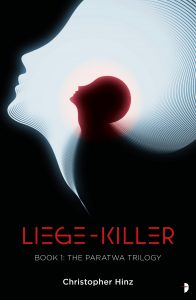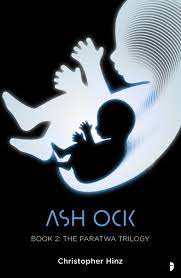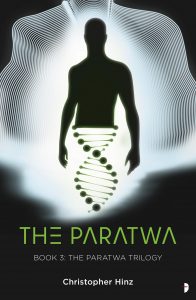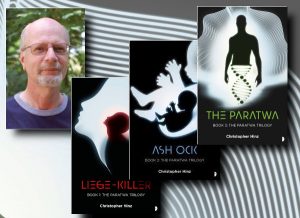Interview with Christopher Hinz (THE PARATWA TRILOGY)
Christopher Hinz’s Paratwa trilogy was an instant cult classic on its release, with the first novel Liege-Killer (1987) winning Hinz the 1988 Compton Cook Award. It was followed by Ash Ock (1989) and The Paratwa (1991), which continued the story of Nick and Gillian, two men woken up from stasis in a post-apocalyptic future to fight the Paratwa, deadly assassins with twinned consciousnesses who caused the apocalypse the first time round. The story made the jump to comics with Gemini Blood (1996-7), written by Hinz and illustrated by Tommy Lee Edwards. Hinz disappeared off the radar for some time after that, but re-emerged triumphantly with Angry Robot, who published Binary Storm (2016), a prequel to the original Paratwa trilogy. Since then, Hinz has had something of a renaissance, with space opera Starship Alchemon (2019), SF thriller Refraction (2020) and the alternate history novella Duchamp Versus Einstein (2019, co-written with Etan Ilfeld), introducing Hinz’s exciting, action-packed yet deeply intelligent take on science fiction to a new generation of readers. This year, Angry Robot are bringing Hinz’s Paratwa trilogy, remastered for a new generation of SF readers by the author, back into print for a new generation of fans.
Christopher Hinz was kind enough to speak to The Fantasy Hive via Zoom.
Angry Robot are reissuing your Paratwa trilogy in October this year. Would you be able to tell us a little bit about it?
These are the remastered editions of the trilogy. So they’re a little different from the originals. But essentially, the story in the trilogy is that there’s a bio nuclear apocalypse in the late 21st century, and it pretty much wiped out humanity on earth. The survivors emigrated to these giant cylinders orbiting Earth, known as the Irryan Colonies. One of the chief causes of the apocalypse was the Paratwa assassins, which were genetically engineered lab bred killers with a very unique ability to exist simultaneously in two separate bodies. One consciousness, one mind, but they can exist in two different bodies at the same time, which gives them a big advantage in combat type situations. So several hundred years after the apocalypse, the Irryan Colonies have been living pretty much in peace, and no Paratwa assassin has been seen for two centuries. They’re believed to have been wiped out. One of them somehow gets awakened from cryo sleep, is found in the remains of the city of Philadelphia, and is transported up to the colonies, awakened and goes on this mad killing spree. And the colonists are overwhelmed. They’re not really prepared to deal with this level of violence. They end up awakening two men from the past who actually fought the Paratwa and hunted down and killed them. These two men are Nick, who is a brilliant hacker, and Gillian, who is a tormented soldier. They soon learn that the particular assassin who was awakened is called Reemul. He’s known as the Liege-Killer, and he was probably the deadliest of all the assassins. They go after him. And that’s the start of the trilogy. And then they start to learn that there’s much more going on behind the scenes. And there’s a whole political agenda. And there’s a secret species, some Paratwa leaders, who are called the Ash Ock who are creating problems behind the scenes, and their ultimate goal is to conquer humanity. Anyway, that’s the trilogy that nutshell.
 As you said above, with bringing these books back, you’ve made the choice to remaster them. In the beginning of this edition of Liege-Killer, you talk a bit about the changes that you’ve made. How did you update the trilogy without changing it into something that’s sort of significantly different from what it was in the first place?
As you said above, with bringing these books back, you’ve made the choice to remaster them. In the beginning of this edition of Liege-Killer, you talk a bit about the changes that you’ve made. How did you update the trilogy without changing it into something that’s sort of significantly different from what it was in the first place?
It’s essentially the same story. The main focus of the trilogy has not changed. But the original impetus for doing the remastered editions is that technology and science have changed so dramatically. These books were written originally in the late 1980s, early 1990s. There was no internet to speak of, there were no cell phones to speak of. Social media within didn’t really exist, not in the form it does today. We hadn’t discovered any exoplanets yet. There was no human genome sequencing. A myriad of changes has occurred over the last 30 plus years. So that was the impetus to update the science and technology, and then once I got into the nitty gritty of the books, as a writer, I just saw all sorts of ways to improve things. Sometimes it was just really fine tuning a chapter making things a little clearer. Other times, it was inserting brand new chapters and throwing out some older stuff that really didn’t fit anymore. I ended up making a lot more changes than I had originally envisioned. But I think it turned out well, I’m very happy with it. I think it really updates the trilogy for a contemporary audience, which is what we’re all hoping for.
And it’s nice to see them back in print as well, because they’ve been out of print for a while.
Yeah. I won’t go into the details, but there were some complicated licensing issues that kept them out of print conditions for a number of years. The issues resolved themselves naturally, a couple years ago. Then Angry Robot and I got together and they were very eager to do reprints of the books. Then I think I was the one that threw out well, we ought to really update them, and everything sort of went from there. So like you said, they come out this October. Really nice covers, I don’t know if they just sent you emails of the ebooks….
They sent me the physical copies! Yeah, they’re very attractive books.
Yeah, it was more of an elegant look than than the original editions, which were more science fiction-y and combat themed. But I like the look, it’s sort of given them kind of a classic look, which is nice.
The figures of the Paratwa, these twin assassins who are sharing one consciousness, are essential to the whole trilogy. Where did this idea initially come from?
Many years ago, back in the 1980s, I had some of the initial ideas. I’d actually been doing some therapy at the time. It was in my younger days, exploring things. And one of the points of the therapy is that we all have our intellectual lives and our emotional lives. And somehow that transmogrified into this idea that well, what if we’re two beings at the same time? Then that sort of got switched all around and I thought, Okay, well, what if we’re just one being, but we have these two separate essences, and that basically somehow got changed into the notion of the Paratwa. So that was sort of the starting point, the initial idea.
How did you find writing them as characters? In the third book, you have the action sequence from the point of view of the Paratwa…
Are you talking about Meridian, the Paratwa Lieutenant? He sort of comments throughout the trilogy, providing the viewpoint of what the Paratwa are seeing the world and seeing humanity as. I just thought it was an interesting idea, a way to get in another point of view. The point of view jumps around a bit. The main characters are Gillian and Nick who I mentioned earlier and but we also get to see Rome Franco, who is the head of E-Tech, which is an organization which has come to prominence in order to limit the expansion of technologies that have in the past proved detrimental to humanity. So there’s a lot going on with point of view, and I like that as a writer because it gives me a chance to jump into somebody else’s way of looking at the world. I think the more different types of points of view you can get across in a in a book, the more wide ranging you can make the story.
The whole E-Tech thing about limiting human access to technologies is quite interesting, reading it now with people’s fears around artificial intelligence. The opening chapter where you show the reader this completely destroyed and ruined Earth is chilling. Do you feel like those anxieties have sort of come back around again now, however many years after you originally wrote the books?
Yeah. Maybe it’s a by-product of aging. But I’m more pessimistic about humanity’s survival than I was 30 plus years ago when I wrote the trilogy. I mean, climate change is doing horrible things to the whole planet, and will do even more horrible things. We’re wiping out species, right and left. There’s going to be massive food and water shortages in different areas in the world, it seems inevitable at this point. Things are not looking real great for humanity’s future. But I’m an eternal optimist. I think somehow, the majority of the species will be able to survive. And hopefully the worst of the problems and incidents outlined in the trilogy won’t come to pass. So hopefully not an Earth-ending, global bio-nuclear apocalypse, that’s probably the worst case scenario!
Let’s hope we managed to avoid that one! So as well as the Paratwa trilogy, you also wrote the comics, Gemini Blood. And, on top of that, there’s now a Liege-Killer graphic novel as well. So how have you felt about transferring the story from this written medium to the comic medium? Because there are a lot of visual aspects to the series, was it something that felt quite natural with the story?
In Gemini Blood I was taking a very different look at the idea of the Paratwa. It’s similar to the novels in some ways, but very different. It is its own separate story. It was something the publisher originally approached me about doing. DC Comics was at the time doing their new Helix line, which was going to focus on various creator own science fiction projects. It was fun to do, because it was an interesting take on it. Right now, there are actually some people interested in and working on a television series version of Liege-Killer. So I have no idea if that will come to pass or not, it’s in very early stages yet. But I’ve seen some of what the writer has done. And it looks really encouraging. So I’m hoping that someday comes to pass! But any kind of adaptation, it really is, you know, apples and oranges, you can’t really mix them at one level. There’s going to be a book, a comic book, and a movie or a TV show, and each is gonna have their own identity.
 And was it from doing the Gemini Blood comic that led you into your other comics work? Because you wound up writing a bunch of issues of Blade as well…
And was it from doing the Gemini Blood comic that led you into your other comics work? Because you wound up writing a bunch of issues of Blade as well…
Once I got one comic book project out there it led to some others. I had the opportunity to work on Blade, which was really neat. That came about came about very fast. I think something happened in that they lost their original writer at the last minute and they were already due to publish. I literally got a call from the editor on a Friday afternoon asking me if I wanted to take a shot at writing it. I think I did the best I can under a pretty tight timeframe! But that was fun to do. That was fine. There’s some good art with that. It didn’t sell as well as we would have liked unfortunately. But it was hard. Although the Wesley Snipes movies were popular at the time, Blade as a comic book character was never really a premiere character in the Marvel Universe. So sort of like a side character. But we did okay, and it was it was a fun experience.
As well as the trilogy and the comics, you also wrote the prequel novel Binary Storm. Am I right in saying that was your first book with Angry Robot?
Yes, it was. I believe in 2016, if I’m not mistaken. I always had no intention of taking the trilogy farther into the future. But I always, even from the beginning, thought that it might be interesting to have a prequel to see what actually happened in the pre-apocalyptic era of Earth, which would have been late in this century. So that was a neat project to do. I think if people read the trilogy and enjoy it enough, they can go back and read Binary Storm, and pick up a lot more details about how that universe developed originally.
That was that was your first published book for a while, wasn’t it?
Yeah, there was a long gap in there. I did a self-published novel in 2012, called Spartan X. That was sort of my one and only attempt to try the self-publishing route, and it didn’t really work out too well, in terms of sales. It was hard. I was sort of just pushing it on my own. By that time, the books really been out of print for a long time. It was difficult going. I always felt stronger with a publisher behind me. Before that, yeah, there was a long period there. I got away from books in the 90s when I had the opportunity to do the comics, and I concentrated on them. I made an attempt at doing screenplays for a number of years. Nothing really developed there. It’s a hard market to crack. So I ended up drifting back into novels, slowly but surely. They’re probably my first love. With a novel, you can really delve deeply into character and situations and a lot of subtleties that it’s harder to get across in a screenplay or in a comic book. So I’m glad I’ve come back. And Angry Robot has been very supportive as a publisher. They’ve been behind me for now for several books. Actually, with the trilogy, this will be 6 straight books. Yeah, so Binary Storm, Starship Alchemon, which is a sort of a complete revamp of an earlier book called Anachronisms. And then last year, there was Refraction, which is a standalone, contemporary science fiction thriller. So I’m very excited about the trilogy, and hopefully Angry Robot will do well enough with it that I can keep publishing with them.
Yeah, fingers crossed! As well as the books, you’ve also had the novella with Angry Robot, Duchamp versus Einstein, that you did with Etan Ilfeld. So how did that come to pass?
That was initially an Etan idea. He came up with the notion of doing these two characters and it really transformed incredibly over the writing of it. It started out as one thing and it developed into something else. We went back and forth and it was a long project that actually took years, it was fun to do. That had been the first time I’d ever had a co-author and it was the start a new experience for me. It was an enjoyable book, a very different kind of book, from the thing that I was used to writing. But yeah, it was it was a fun project to do.
You mentioned earlier that there’s that connection between Starship Alchemon, which is your space opera novel with Angry Robot and the earlier book, Anachronisms. So how did that come about? Because it’s not so much a remastered reissue like with the Paratwa trilogy, it’s almost like a different take.
Yeah, exactly. It’s a whole different version of Anachronisms. Basically, it sort of starts out the same, even though the early chapters are also heavily rewritten, but then it just goes in a completely different direction. That was just a personal thing. Anachronisms was actually the first book I ever wrote. But it ended up being published after Liege-Killer. I was never crazy about it. It was something that I probably should have kept in a drawer, not sold it at all, originally. Because it really never came together the way I wanted it to in my head. So anyway, many years later, I had the opportunity. And I thought about redoing it the way I wanted to do it. And that’s how Starship Alchemon developed.
 How did it feel returning to that idea after all that time? Did it give you a fresh perspective on it?
How did it feel returning to that idea after all that time? Did it give you a fresh perspective on it?
Yeah, well, first of all, I had to reread it, and remember what I’d written, it was so long ago! It was definitely a very new perspective on it. Once I started reading it I realized what I really wanted to do with it. And it wasn’t that hard a project to do. Because the basic outline is already there, at least in the beginning. But it turned out to be a fun project. And I’m kind of proud of it. It’s sort of my corrected version of Anachronisms after all these years. A lot of times, you don’t get a chance as an author to do that. I was so pleased that Angry Robot again, got behind me on that and said, let’s give it a try.
Your other book with Angry Robot, Refraction, that’s almost like your take on the whole superhero thing. These kids have superpowers, but they’re being experimented on, and they have to find out what’s going on. So how did that one come about?
Trying to think back, the original idea for that came probably back in the late 90s. It was a project I sort of played around with and had other titles and other characters at the time, and it never really came together. For whatever reason, my authorial sensibilities latched on to it, and I just started to see where the story should go in my mind, and just started writing it. I’m really happy with the way it came together. I’ve heard some comments about it, there’s a certain ambiguity toward the ending. Because you meet this very strange alien character, and you don’t really get clear answers about everything that’s happened. I know some readers have told me that they don’t like that. They like a book that finishes very clearly and all questions are answered. But in the long run, I thought that came out very well. It was deliberately intended to be ambiguous.
Okay. And just to bring this to an end, what are you working on at the moment?
I’m working on a new novel, it’s a science fiction thriller in contemporary setting. Not really similar to Refraction, just they both have a contemporary setting. It’s a very different type of a story. I don’t like to talk about specifics of anything I’m actually working on because I’m still working on it. I’d rather, get to a point down the line where I’m finished with it. Hopefully it will be my next novel, late next year. That’s the goal. So we shall see!
Thank you Christopher Hinz for talking with us!
The Paratwa Trilogy will be re-released on October 26th Check out the Angry Robot website for an exclusive chapter excerpt and pre-order links


Really enjoyed reading The Paratwa series when originally published – some great ideas and exciting plots made these books firm favourites at the time. Will certainly give these remastered editions a read!